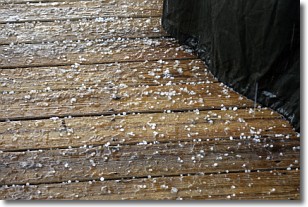Weather Alert in Oregon
Red Flag Warning issued August 12 at 12:25PM PDT until August 12 at 8:00PM PDT by NWS Medford OR
AREAS AFFECTED: Western Rogue Basin including the Illinois Valley; Eastern Rogue Valley
DESCRIPTION: ...RED FLAG WARNING IN EFFECT FROM 2 PM TO 8 PM PDT WEDNESDAY FOR STRONG GUSTY WIND AND LOW RH FOR FIRE WEATHER ZONES 620 AND 622... The National Weather Service in Medford has issued a Red Flag Warning, which is in effect from 2 PM to 8 PM PDT Wednesday. * IMPACTS...Moderate to strong winds combined with critically low relative humidity can lead to rapid growth and spread of new and existing fires. Outdoor burning is banned during fire season. * AFFECTED AREA...Portions of the Rogue Valley in Fire Weather Zone 622, including Medford, White City, Gold Hill, Jacksonville, Talent, Phoenix, and Ashland. In Fire Weather Zone 620, portions of the Rogue and Illinois valleys, including Merlin, Grants Pass, Wilderville, Murphy and Provolt. * WIND...Northwest 10 to 15 mph with gusts of 20 to 25 mph. * HUMIDITY...10 to 15 percent today, 14 to 18 percent on Wednesday. * DETAILED URL...View the hazard area in detail at https://www.wrh.noaa.gov/map/?wfo=mfr
INSTRUCTION: Follow all fire restrictions. You can find your county's emergency sign up form as well as links to fire restrictions at weather.gov/medford/wildfire. One less spark, one less wildfire. Be sure you're signed up for your county's emergency alert system. Familiarize yourself with your emergency plan and make sure you listen to emergency services. Visit ready.gov/plan for more information. A Red Flag Warning is issued when we identify weather conditions that promote rapid spread of fire which may become life- threatening. This does not mean there is a fire. These conditions are either occurring now or will begin soon. It is important to have multiple ways to receive information from authorities.
Want more detail? Get the Complete 7 Day and Night Detailed Forecast!
Current U.S. National Radar--Current
The Current National Weather Radar is shown below with a UTC Time (subtract 5 hours from UTC to get Eastern Time).

National Weather Forecast--Current
The Current National Weather Forecast and National Weather Map are shown below.

National Weather Forecast for Tomorrow
Tomorrow National Weather Forecast and Tomorrow National Weather Map are show below.

North America Water Vapor (Moisture)
This map shows recent moisture content over North America. Bright and colored areas show high moisture (ie, clouds); brown indicates very little moisture present; black indicates no moisture.

Weather Topic: What is Rain?
Home - Education - Precipitation - Rain
 Next Topic: Shelf Clouds
Next Topic: Shelf Clouds
Precipitation in the form of water droplets is called rain.
Rain generally has a tendency to fall with less intensity over a greater period
of time, and when rainfall is more severe it is usually less sustained.
Rain is the most common form of precipitation and happens with greater frequency
depending on the season and regional influences. Cities have been shown to have
an observable effect on rainfall, due to an effect called the urban heat island.
Compared to upwind, monthly rainfall between twenty and forty miles downwind of
cities is 30% greater.
Next Topic: Shelf Clouds
Weather Topic: What is Sleet?
Home - Education - Precipitation - Sleet
 Next Topic: Snow
Next Topic: Snow
Sleet is a form of precipitation in which small ice pellets are the primary
components. These ice pellets are smaller and more translucent than hailstones,
and harder than graupel. Sleet is caused by specific atmospheric conditions and
therefore typically doesn't last for extended periods of time.
The condition which leads to sleet formation requires a warmer body of air to be
wedged in between two sub-freezing bodies of air. When snow falls through a warmer
layer of air it melts, and as it falls through the next sub-freezing body of air
it freezes again, forming ice pellets known as sleet. In some cases, water
droplets don't have time to freeze before reaching the surface and the result is
freezing rain.
Next Topic: Snow
Current conditions powered by WeatherAPI.com




